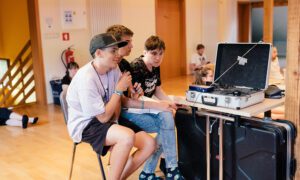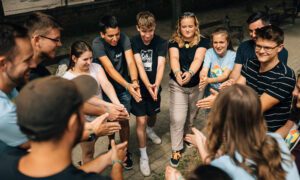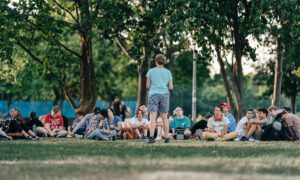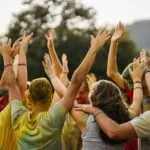July 29, 2022
All Good?
Are things truly “All Good?”
Hardly.
If we look around, we see how the things surrounding us are barely “all good.” It’s been over two years since the outbreak of COVID-19, and we are still struggling to return to “normal life.” Despite our efforts to forget, the disease is still very much alive and continues to hold people and events back from happening. Europe is still reeling from a desperate war that has left an entire nation homeless, displaced, hunted, and persecuted.
Not only is there darkness around us, but we also see it in all of our lives. We struggle with our own sin and see it in our families, homes, friends, and relationships. How can we have decided on a theme that states that everything is “all good” when it clearly isn’t?
And that’s the point. Everything is not “all good.” Nothing in this world is at all close to what good really means. However, we have a perfect, forever example of what good is through understanding and knowing the character of the living God. Instead of focusing on the broken reality that surrounds us, we’ve decided to shift our gaze to who we know God to be—waiting expectantly to see his mighty work transform the darkness around us.
This summer, we’ve seen God work in powerful ways through the 80+ camps that have been taking place all across Central and Eastern Europe.
In one specific English camp in Ljubljana, Slovenia, half the campers were Slovene and the other half were displaced Ukrainian students. The first couple of days were extremely challenging for the camp leaders, as they were forced to navigate cultural and language boundaries—usually involving quadruple translation between English, Slovene, Ukrainian, and Russian.

However, despite these difficulties, God was still extremely active in the lives of the campers and leaders. Kristen Potts—one of the interns serving in Slovenia for the week—stated that God moved in remarkable ways that were more than the leadership team could have hoped for:
“We saw God move during the week in the way that students came claiming no belief or desire for a relationship with him at the beginning of the week; whereas, at the end of the week, they had chosen to pray with leaders and sought more knowledge of Christianity, asking for meet-ups to happen and for discipleship.”
Another way that we’ve seen the goodness of God this summer is that many camps were entirely led by national student leaders—this speaks volumes about the work God is doing in Central and Eastern Europe.
Neja Zupan is a student leader who attended a camp in Radovljica, Slovenia for eight years before accepting Christ. She is now co-directing the same camp and discipling young people for Jesus. When asked what to pray for, she specifically asked for prayer for the students—that they would begin to experience the living God through conversations with the leadership team:
“Please pray that kids get to experience the living God; that through the conversations and small group discussions they would ask questions and be curious about who God is. We pray a bold prayer every year—that every student would make a step forward and a step closer to the Lord.”

Because plenty of Josiah Venture camps are being led by young national leaders, there is a large opportunity to invest in the campers long-term and invite them to year-round youth group. Illés Molnár, a young national who is helping lead a camp in Budapest, Hungary, expressed that camps are a great way to get the students connected with the youth group, and later the local church:
“My favorite part of camp is that we can spend time with kids .… and get to know them better. This will help us connect with them and invite them to youth group in the fall.”

Not only have we seen the goodness of God through discipleship, but we’ve also seen how sharing the gospel cultivates a sense of community and belonging among the campers. Because of the war, there are many Ukrainian students that have been joining English, Fusion, and Edge camps in different countries. Consequently, displaced Josiah Venture and non-Josiah Venture missionaries serving in Ukraine have joined forces with the Josiah Venture country leaders to put on Ukrainian camps in various Central and Eastern European countries where JV staff serve. One of these camps took place in Budapest Hungary where they did a day camp that focused on helping the Ukrainian students get more acquainted with Budapest and help them create relationships with one another in a foreign city/culture.
Katia Kryvanos, a Ukrainian missionary serving in Ukraine, talked about how she saw God work in many different ways during the week:
“I’ve seen God work through this camp simply in the fact that Ukrainian students decided to attend .… On the first day, the kids weren’t very open, but by the third day, they felt more comfortable with us. In our group, one girl asked me how Jesus has helped me in my life. It was her own question, and she was generally curious about God’s involvement. I then could naturally share how he influenced me and my story. The kids become more and more open each day, and they felt that they have more Ukrainian friends now because of this camp. It’s a miracle for many of them.”

When asked about the importance of serving in a Ukrainian camp in a different country, Yulia Turta, a Ukrainian missionary, explained how being displaced is incredibly isolating and lonely, and the difference that these camps have made for the Ukrainian students:
“These teenagers really need someone who will understand and listen to them, but they also need people who will have fun with them. I think that the war and being in a different country has been very hard for the students; they don’t have someone to talk to in their own language, and they lack someone who can fully understand them.”
As we reflect on these events and the many more that are happening across the globe, we are so incredibly thankful to be a part of God’s kingdom work here in Central and Eastern Europe. Please continue to pray for the Josiah Venture missionaries who are sharing the gospel with students and explaining why God is truly “all good.”





